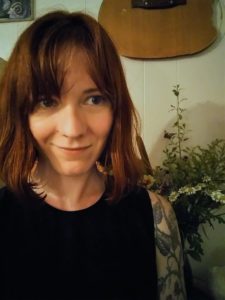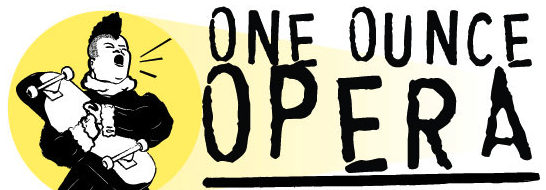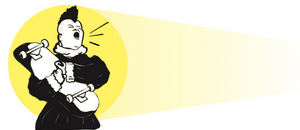Introducing the 5th Annual Fresh Squeezed Ounce of Opera showcase winners Timothy Peterson and Sara Fetherolf, creators of the micro-opera The Seance, in its Texas Premiere.
Performing and producing new works by living composers and librettists offers artists the opportunity for real-time communication. After spending time with the scores and their characters, cast members Carol Brown, Jaimie Lowe, Carmen Johnson, Brian Minnick, and Julius Young had these questions for the creators:
What inspired the libretto? The text is pretty heavy.
Timothy Peterson, composer (TP): When New Opera Works invited Sara and me to compose this scene in 2018 for their showcase of premieres by students at the University of Southern California, we were given the parameter that it take place in one time and place. Sara had the idea of setting the scene as a seance both to satisfy this practical need and allow us to explore themes that interested us, such as our need to name and define things in order to understand and accept them, even when our vocabularies fail us. My first collaboration with Sara was a song cycle inspired by the Greek myth of Philomela, so we also have a shared interest in surreal and fantastic storylines!

Sara Fetherolf, librettist (SF): I was thinking a lot about the threat of anthropogenic climate change, and how the earth’s landscapes, animals, and peoples have been drastically affected by industrialization and colonization. Science can be both a blessing and a curse when it comes to climate change—scientists have identified the ways human activity is killing the planet, and they are working to mitigate the damage. Real scientists, I think, are full of humility and curiosity. Even so, a lot of the technologies that got us into this mess were a result of a toxic combination of imperialism and scientific hubris. I was interested in exploring these themes in the context of a séance, and to specifically riff on Mr. More’s “man of science” attitude, which I see as connected to his assumption that the dead—many of whom have never gotten to speak before—would behave as he wanted them to. I guess those are some pretty heavy themes!
We definitely feel the characters have a lot of back-story. How long ago the siblings’ mother die? After our first read through the opera, we thought that would be an influence in the plot, although maybe it isn’t. Is there something Mr. More is hoping the Medium — or the Dead — will say?
SF: I thought a lot about this—not because it directly affects the plot, but because I wanted believable and developed characters, even in this short scene. In my head, the backstory was that the More parents died when Katherine (Mrs. Foster) was very young, so she doesn’t remember them much. The Mores are old money, and she was raised by nannies and boarding schools. She’s grown up to be a practical, no-nonsense woman who is not particularly close to her brother. Mr. More, however, was a teenager when his parents died, and the grief of losing them—especially his mother—has made him crave explanations about death and the afterlife. Unfortunately, he thinks he can buy the answer instead of accepting the mystery. I think he wants a séance where he gets all the reassurances he needs from his dead loved ones.
But this is just one possible backstory! Ultimately, I wanted to leave it open enough that the audience and the performers could fill in the characters’ histories and motives for themselves.

Where did the inspiration for the personality of The Dead come from? It seems to be more than just the ghost of an Egyptian woman.
TP: When we think of our relationship to the dead, we often think of our lost loved ones. In the historical seances that inspired our scene, spiritualists were most interested in communicating with the spirits of those whom they knew personally. Sara and I were interested in exploring what it might mean if we viewed death as something that concerns more than humans in the present, especially our loved ones. What if we considered the deaths of strangers from the distant past and honored death as a phenomenon that affects the natural world as well, especially due to harmful human activity? In our scene, the Voice of the Dead represents this more expansive embodiment of death.
SF: Yes to all of that. Death is so much bigger than how we often think about it. It’s a natural process that allows for regeneration and new life, and it’s also an injustice that has been inflicted on people and living things that stand in the way of “human progress.” I imagined the Voice of the Dead as a composite of all the many plants, animals, and people who have died and are desperate to say something about it. They have finally been invited to speak to someone who has never bothered to consider their stories, and so they take the opportunity.
Timothy, we’re curious whose music influences your composition style the most. What composers inspire you?
TP: I’ve always loved the music of 20th-century French composers. Some of the music that I composed for the Voice of the Dead’s character was inspired by Milhaud’s L’Orestie d’Eschyle, especially his setting of Athena’s supernatural voice in harmony distributed among multiple voice parts. Living composers whose vocal music inspires me include Christopher Cerrone, Elliot Cole, Caroline Shaw, and Ellen Reid.
Watch a preview with the cast of Seance below!

